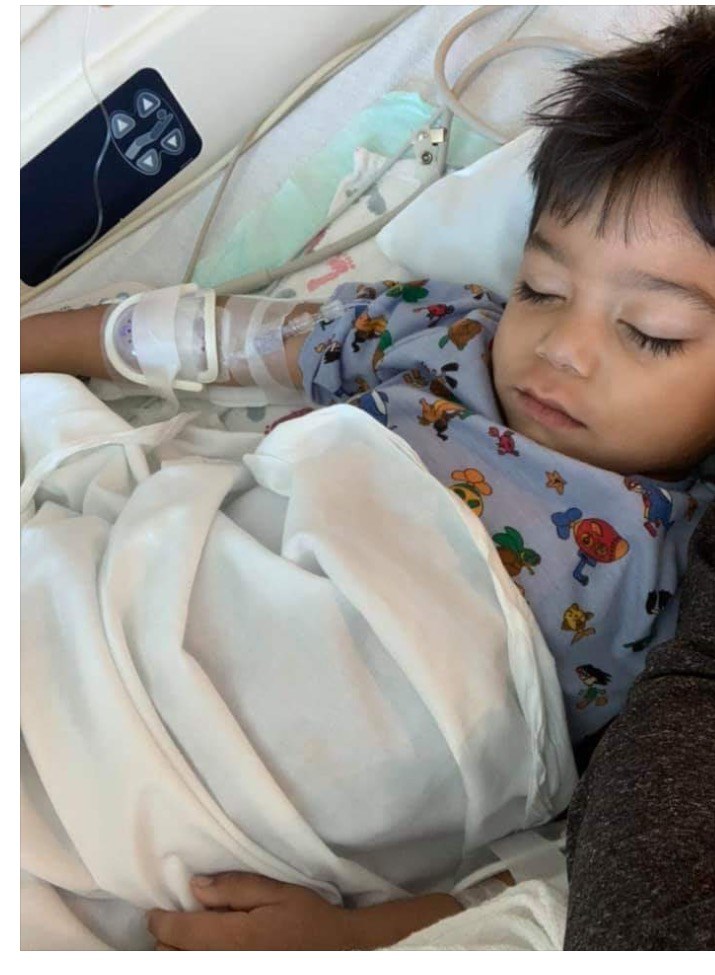Britney Boler of Plano thought her 3-year-old son was coming down with a cold one Monday afternoon in late April when he wanted to go to bed early.
That wasn’t like Titus, the usually rambunctious toddler who wanted to play outside with his dog.
He spiked a fever of 101 overnight. So the next day she took him to the emergency room at Children’s Medical Center Plano.
Boler, a 28-year-old single mom, didn’t want to chance it in the middle of a worldwide pandemic. She also wasn’t sure where else to go after losing her insurance along with her sales consultant job during the recent lockdown.
A strep test came back negative, and the ER doctor sent him home to rest. Boler's son wasn't showing enough symptoms to test him for the coronavirus.
The next day Titus began crying out in pain.
“He kept saying that his tummy was hurting, hurting bad,” Boler says.
His fever shot up to 103, so she took him back to the hospital where they ran multiple tests. They thought he might have a urinary tract infection and sent him home with antibiotics.
But Titus kept getting sicker. Over the next day his fever rose, remaining steady at 104. He was vomiting and his eyes were bloodshot. His lips and feet were swollen. He was breathing fast. His tongue was strawberry red.
Leaning on her motherly instincts, Boler took him back to the emergency room a third time. By then his blood pressure had dropped so dangerously low that he was rushed to the intensive care unit.
They tested him for COVID-19. It came back negative.
Boler says the doctors believe Titus had Kawasaki syndrome, an inflammatory disease that has been around for some time but is considered rare. It doesn’t have a test to make sure.
This week the Centers for Disease Control and Prevention announced that it is investigating reports that multisystem inflammatory syndrome in children (MIS-C), which may present with Kawasaki disease-like features, is showing up in children who may have been exposed to COVID-19.
“That was the scariest thing I ever had to go through,” Boler says. “The whole time I was thinking I was failing as a mom. I was crying because I wasn’t getting answers.”
But she doesn’t blame the doctors.
“They were doing everything they could do,” she says. “It just breaks my heart that my son was feeling so bad. He was so sick.”
Cases of the rare, potentially deadly syndrome (MIS-C) in children have been identified in nearly half the nation's states, including New York City where the health department has reported 147 cases. The patients range in age from 3 to 18; 73 percent of the children tested positive for the virus or its antibodies.
Kawasaki syndrome has been around for awhile, says Dr. Jeffrey Kahn, chief of infectious diseases at Children’s Health and professor at University of Texas Southwestern.
It’s been getting a lot of attention now, he says, because there are so many similarities to an inflammatory syndrome that could be related to COVID.
“Preliminary reports are just coming in and we don’t fully understand it,” Kahn says. “Hopefully, we will be getting some answers in the near future.”
The disease was first described in Japan by Tomisaku Kawasaki in 1967, and the first cases outside of Japan were reported in Hawaii in 1976, according to the CDC website.
Clinical signs include fever, rash, swelling of the hands and feet, irritation and redness of the whites of the eyes, swollen lymph glands in the neck, and irritation and inflammation of the mouth, lips, and throat.
A major fear is that Kawasaki syndrome could cause complications including coronary artery dilations and aneurysms. The standard treatment, intravenous immunoglobulin and aspirin, substantially decreases the development of these coronary artery abnormalities, Kahn says.
Children’s Health officials say they are continuing to monitor any new cases of MIS-C but couldn’t say how many children have been treated for the syndrome at the Plano facility.
Boler says her son is doing much better now. He was running around the house this week, eating carrots, and trying to feed them to his dog.
His pediatrician detected a slight heart murmur, and Titus is scheduled for an electrocardiogram next week. Boler is hoping to get samples of his blood sent off to test for antibodies for COVID-19.
“It was frustrating to keep going back but I am thankful doctors got it under control quickly in the end,” she says. “Parents, trust your gut. Keep taking them back if you think your child is sick.”




